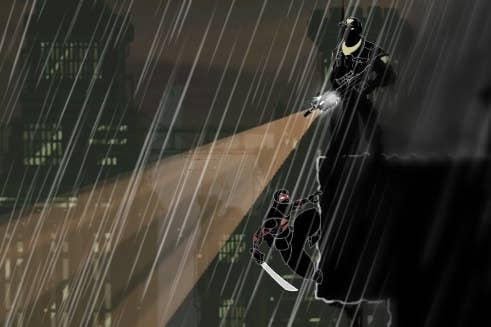Talking Shop: Writer
Mark of the Ninja writer Chris Dahlen sits down with us to talk about his career
In our continuing Talking Shop series, GamesIndustry International sat down with Chris Dahlen to talk about writing for games. Dahlen was the writer for Klei Entertainment's Mark of the Ninja and he previously worked on Blue Fang Games' Carmen Sandiego for Facebook. In his previous career as a journalist, Dahlen contributed to Pitchfork, Kotaku, Kill Screen, and the Boston Phoenix. More information can be found on his official website.
I'm a writer for games. I've been a games journalist for the past seven years and I've moved into writing for games. So, actually writing the scripts for games. Working on them instead of reporting on them.
The interesting thing about writing games in any sense - whether it's contributing to the story, or writing a script, or any of the things that go into using words in a game, using story in a game - is that the job can be really different depending on the project and depending on the team. On Mark of the Ninja, I came in when the premise and the story were there. So they really just needed someone to write the script. To write the dialogue, the words on screen, the collectible items that you might find.
There are other cases where you might bring in a narrative designer who's there from the beginning. Who helps you plan out the concept, the premise, the themes, and the background information. Who's writing the story bibles and giving you all that material that the whole team can then work on to develop the world and tell the story. It can run the gamut.
I've worked on Facebook games where it's really about contributing little bits of text. The first thing I worked on is Carmen Sandiego for Facebook, which was really fun and really difficult. I was on a team with two other guys and we each wrote around 3,300 clues. I focused on location clues. So, I wrote 200 characters or a couple lines of text for each clue, covering 66 cities at three levels of difficulty. So, it's really a job about doing a lot of research, sitting down, and filling out spreadsheets. That looks nothing like the work a Hollywood screenwriter would do making a script for a movie.
That gives you the idea of the different kinds of deliverables that a writer for games might provide.
No, like it says, you're the designer on the team who's focused on narrative. Thinking of ways to manage the narrative. The thing that is a little vague about it - and I'm really careful to point this out - is that it's always a team effort. Every part of the team is doing the storytelling; the art, sound design, and obviously the gameplay. The gameplay is the most important part of telling the story.
The weird thing about being a writer is you're responsible for the words... you contribute to the story, but you do it in a way that's more dependent on the team than other people. The artists are the ones who do the art, and that has a bigger impact than the one person who does words. You're more reliant on bringing up ideas that other people are going to flesh out, as opposed to having your one deliverable that no one else can touch.
That makes it exciting because it's really fun to tell a story with other people; to be in a room where you're stumped about what to do with the ending and then someone in the art department's like, "here's how we should end it" and it's great. You wouldn't be in a situation where only the narrative designer gets to suggest an ending. The whole team is putting this together and the whole team is expressing the story through all their disciplines. You're the person who has more focus on it, because you're the narrative designer.
I think I knew going in that it's not like writing a novel or short story. It's not even like writing a script. A Hollywood screenwriter goes through revisions, notes, and a lot of hassle, but the script is the script. It's clear that [game writing] is a different kind of role.
I'm working on two projects right now, one as part of a team flushing out a concept that'll hopefully go on to become a finished game. That's a lot of fun and I feel like I have a good stake in it. I'm also working on a text game - an all-text branching story game - in ChoiceScript and that's all me. There's no one else to make it better, but I get to own it. What's interesting about that is even though it's an entirely text game, the first thing I had to do was sit down and write a 20-page design document to work out design stuff. Variables, branching, and structure. I didn't have the lead designer of Mark of the Ninja, Nels Anderson, doing that. So, I had to figure it out.
"I knew going in that it's not like writing a novel or short story. It's not even like writing a script."
There are exceptions where the writer really gets to own it, but generally it's a team thing. I wasn't surprised about that. I figured it out. There are other things I definitely did learn switching into the industry side of it. I understand much better how games are made. What you can control, what things to can do to get meaning across to people, what the pitfalls are, and most of all how hard it is to make games. I appreciate that so much more than I thought I would.
I'm freelance because of the gigs that have come my way. Certainly if I could make a full-time thing work with one studio - if it was a good studio - I wouldn't say no to that. I haven't really had the opportunity to think about that, let's put it that way.
I've been a writer for 12 years now and I started out writing about music. I started with Pitchfork in 2002. Around 2005, I started writing about games, because games are more exciting than music in my mind. There's interesting things that are going on in music and tech, but I love thinking about and writing about the friction between rigid, literal software and business needs and the creative side. It's interesting to see those two sides come together and that was more exciting to watch in the games side than the music side. So, I don't really write about music anymore.
I don't know of a lot of programs that teach [games writing] - if you were going to come at games writing with formal training it would probably be as a screenwriter. I could be really wrong, but I don't think there are a lot of writing programs the way that if you were an artist and you wanted to go to a game school to be an artist, they would keep you busy. They would know what to teach you, and I don't think they have those programs - certainly not on that scale - for writing.
I definitely felt like a part of the team. I was able to bring some ideas to the game. I'd be careful to characterize myself - I came in late in the process and I was a contractor while the rest of the team was full-time. I didn't have to work as many hours as the regulars on the team. The length of the script that I wrote represents less effort than the environmental art or character designs. And that can work out. It's a small deliverable in those cases.
That's an interesting question. I have my office at home with a computer and everything, but I find myself setting up at the kitchen table or at a coffee shop. What I found with Mark of the Ninja, is that a lot of it is the time when you're just thinking somewhere and just digesting idea. Things will come out of that.

With Mark of the Ninja, we had these collectibles throughout the game. There's three in every level; you want to find them and get a bonus. We wanted to do some kind of audio log, but we didn't want a minute of speech. That fits really well in Bioshock, but it wouldn't fit in our smaller, 2D games where you'd be in the middle of something else by the time it got to playing the end of that thing. So, we came up with the idea of doing haiku. They're really short, but they also give you a reason to come back. With Carmen Sandiego, I'm sitting there with rough guides trying to find 66 things to say about a city. For haiku, if I went for a walk in the woods and came back after an hour with two sketched out, that's great. That was a good effort. 34 syllables, this is terrific!
I'd really enjoy if he went into games. It'd be cool if he went into writing and I would tell him, be a team player. Learn to understand other people and work with them. Work with them to make the best experience possible.
Those looking to get into the industry can take a look at GamesIndustry International's Jobs Board.









